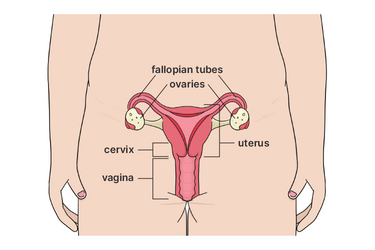Fallopian tube cancer is a rare cancer that forms in one or both fallopian tubes. It’s more common after menopause. Read more about this cancer, the symptoms, causes and how it’s diagnosed.
What is fallopian tube cancer?
Symptoms
Causes
Diagnosis
Treatment
When to see your doctor
Related resources
Fallopian tube cancer is a rare cancer affecting one or both fallopian tubes (the tubes that connect the ovaries to the uterus).
More than 95% of fallopian tube cancers grow in the cells that line the fallopian tubes. But sometimes the cancer can form in the smooth muscle of the fallopian tubes.
The below picture shows the female reproductive organs.

Many people don’t have any symptoms in the early stages of fallopian tube cancer. But possible symptoms can include:
See your doctor if you have any of these symptoms. They may be due to other conditions or health issues (e.g. digestion and bowel problems), but it’s important to check.
We don’t know the exact cause of fallopian tube cancer and there are no screening tests available.
Some people who develop fallopian tube cancer don’t have any risk factors.
But risk factors can include:
Most cases of fallopian tube cancer are hard to detect during a physical examination, unless the cancer is advanced and can be felt as a mass. It can be difficult to differentiate between fallopian tube and ovarian cancers.
Fallopian tube cancer may be detected during tests for other conditions.
If you notice symptoms, see your doctor. They will ask questions about your symptoms, medical history and family health history. You may also need to have blood and urine (wee) tests.
If your examination and test results suggest you may have fallopian tube cancer, your doctor will refer you to a gynaecological oncologist (a specialist in gynaecological cancers) straight away.
You may need more tests to diagnose fallopian tube cancer. For example:
Treatment for fallopian cancer depends on the extent of the cancer. It may include:
Cancer treatment, such as chemotherapy and radiotherapy, can cause menopause. Learn more about menopause due to cancer treatment.
It’s important to see your doctor if you notice any symptoms of fallopian tube cancer. In most cases, early detection and diagnosis lead to good outcomes.
This web page is designed to be informative and educational. It is not intended to provide specific medical advice or replace advice from your health practitioner. The information above is based on current medical knowledge, evidence and practice as at April 2023.
This content has been reviewed by a group of medical subject matter experts, in accordance with Jean Hailes policy.
© Jean Hailes Foundation. All rights reserved.